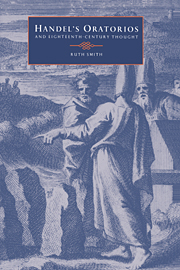Book contents
- Front Matter
- Contents
- Acknowledgements
- Abbreviations
- Introduction
- PART 1 ENGLISH ORIGINS OF ENGLISH ORATORIO
- PART II THE PATRIOT LIBRETTO FROM THE EXCISE BILL TO THE JEW BILL: ISRAELITE ORATORIOS AND ENGLISH POLITICS
- Chapter 8 Political events and political thought
- Chapter 9 Allegorical politics
- Chapter 10 Moral politics
- Chapter 11 ‘Esther’ to ‘Athalia’
- Chapter 12 In time of war
- Chapter 13 Images of government
- Chapter 14 The conflict of public and private interests
- Chapter 15 Coda: the end of Handel's Israelite oratorios
- Appendix I Libretto authors and sources
- Appendix 2 The oratorios and Methodism
- Notes
- Bibliography of sources cited
- Index
Chapter 12 - In time of war
Published online by Cambridge University Press: 22 September 2009
- Front Matter
- Contents
- Acknowledgements
- Abbreviations
- Introduction
- PART 1 ENGLISH ORIGINS OF ENGLISH ORATORIO
- PART II THE PATRIOT LIBRETTO FROM THE EXCISE BILL TO THE JEW BILL: ISRAELITE ORATORIOS AND ENGLISH POLITICS
- Chapter 8 Political events and political thought
- Chapter 9 Allegorical politics
- Chapter 10 Moral politics
- Chapter 11 ‘Esther’ to ‘Athalia’
- Chapter 12 In time of war
- Chapter 13 Images of government
- Chapter 14 The conflict of public and private interests
- Chapter 15 Coda: the end of Handel's Israelite oratorios
- Appendix I Libretto authors and sources
- Appendix 2 The oratorios and Methodism
- Notes
- Bibliography of sources cited
- Index
Summary
ISRAEL IN EGYPT
As described in chapter 9, on 18 April 1739 the London Daily Post carried a letter, by ‘R. W.’, about a performance of Israel in Egypt. This is a remarkable instance both of how much political weight a single artistic text could be made to carry in mid-eighteenth-century England, and of the assured dexterity with which allusion could be wielded. The writer particularly mentions the presence in the audience of the Prince and Princess of Wales, rejoicing that these leading lights of the British people were ‘able to be so highly delighted’ with the oratorio: ‘what a glorious Spectacle! to see a crowded Audience of the first Quality of a Nation, headed by the Heir apparent of their Sovereign's Crown and Virtues, with his lovely and beloved Royal Consort by his Side’. The three performances of Israel coincided with the conclusion of Bolingbroke's stay in England (July 1738 to April 1739) to co-ordinate the attempt to bring down Walpole's government, and this ‘review’ is a single shot in the concerted assault. The performance attended by the prince and princess had not been part of Handel's programme for his season; the second was publicised as the last, and this extra one was announced as being mounted ‘at the Desire of several Persons of Distinction’.
- Type
- Chapter
- Information
- Handel's Oratorios and Eighteenth-Century Thought , pp. 288 - 303Publisher: Cambridge University PressPrint publication year: 1995

